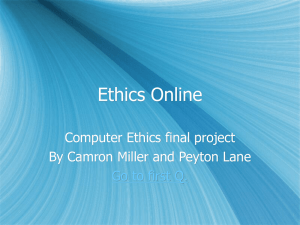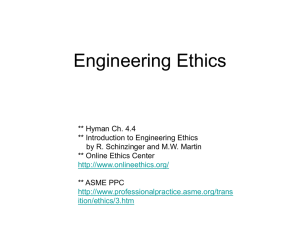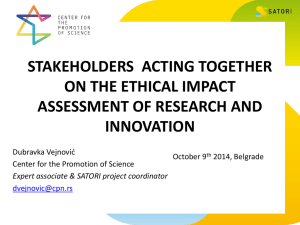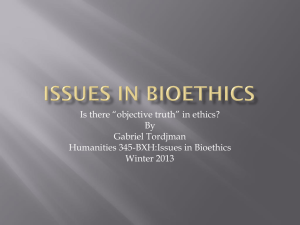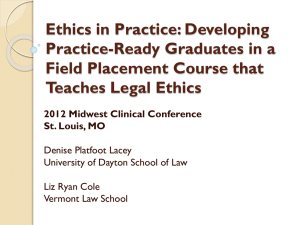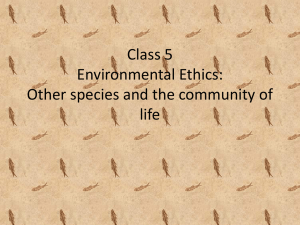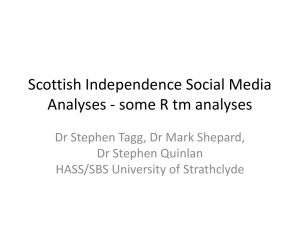We Taught Ethics - Southern Business Administration Association
advertisement
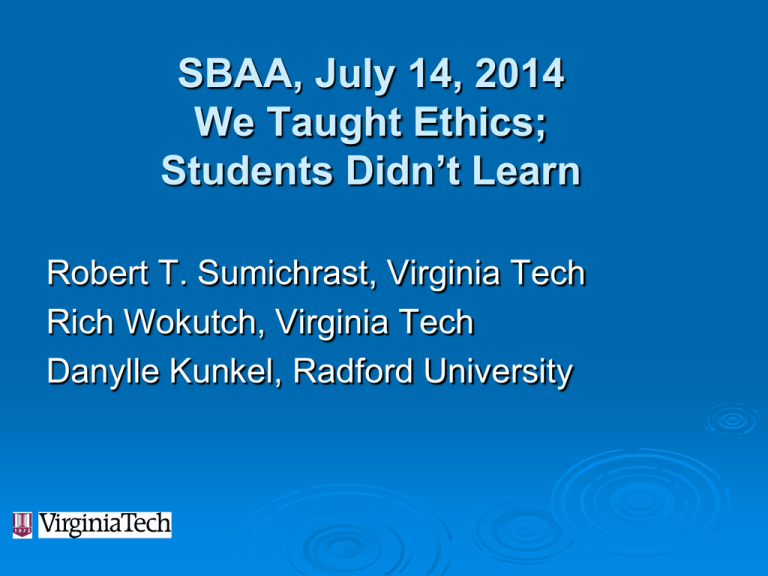
SBAA, July 14, 2014 We Taught Ethics; Students Didn’t Learn Robert T. Sumichrast, Virginia Tech Rich Wokutch, Virginia Tech Danylle Kunkel, Radford University 2013 AACSB Standards 1A. The school must encourage and support ethical behavior by students, faculty, administrators and professional staff [Ethical Behavior] Institutionalizing Business Ethics: A Personal Campaign Background: • VT Historical Strength • Change in AACSB Requirements • Organizational Context Institutionalizing Business Ethics Request for a proposal MBA Ethics Oath MBA Ethics Oath Institutionalizing Business Ethics: A Hybrid Approach Business Ethics Pedagogical Debate: Stand-alone course versus Integrative Approach A Hybrid Approach: Take 1 Course structure 2 semesters Stand alone class meetings • Cases, lecture, projects Team teaching in other MBA core courses Recognizing ethical situations Decision making model Ethical Leadership Introduction to Ethics Foundation and Theories Decision Making Foundations Goal of Hybrid Approach to Teaching Ethics Crossdiscipline application Crosscultural application Corporate Leadership Stand Alone Course Pros: Certainty of coverage Subject area expertise available Signaling effect of importance of ethics Cons Ethics seen as separate from “real” business decisions Team Teaching Method Pros Improves Student Learning Outcomes Areas of Expertise Different Perspectives Cons Time and Willingness Possible Conflict Possible Student Confusion Advantages of Hybrid Approach Expertise in ethics and functional business disciplines Very strong signaling effect of importance Certainty of coverage Coalition building Institutionalization effect Costs of Hybrid Approach Time, time, and more time Expense Faculty coverage and load concerns Potential for faculty resistance Potential Problems Faculty resistance Substitute Teacher Mentality Scheduling Forgetting Classes Student Adjustment Communication and Trust Student Logistics Integrative Classes Quantitative Methods Finance Accounting Marketing Business Information Technology Organizational Behavior Job Search Strategies Human Resource Management Ethics in Quantitative Methods Mark Twain: “There are three kinds of lies: lies, damn lies, and statistics.” “How to Lie with Statistics” Ethics in Finance LIBOR Daily Show's Summary of LIBOR Scandal Bank • Rate Fixing Scandal Fraud Goldman Sachs Finance: Causes of the Great Recession of 2008-? Alan S. Blinder, “After the Music Stopped” Villain 1: “Double Bubble Toil and Trouble” Villain 2: Excessive Leverage Used to Bet on the Bubbles Villain 3: Regulators “Asleep at the Wheel” or “Drinking the Kool-Aid”? Villain 4: Unscrupulous Subprime Mortgage Lending Villain 5: “Complexity Run Amok” Villain 6: Incompetence and Conflicts of Interest at Ratings Agencies Villain 7: “Crazy Compensation Systems”—“Heads I win; tails you lose” Ethics in Accounting Arthur Andersen and Enron Accounting Ethics Mini Cases The Case of the Plant Relocation An Inside Job Ethics in Marketing Apple and Foxconn John Stewart and the Fear Factory HBR Case: “Taking the Cake” by Ben Gerson—Southland Baking and Health Concerns Ethics in Business Information Technology Snoop Stick Hitachi Business Microscope Ethical Issues in the Job Search Process Cases: *Continuing interviewing after accepting a job *Resume falsification Ethical Issues in OB Stanley Milgram's Experiment Daniel Ariely and Cheating--Ted Talk Ethics in HR 1. Knowingly hiring someone who is likely to be let go in less than a year (and not tell them) 2. Using diversity as a tiebreaker among finalists for a job 3. Making a less attractive job offer to someone you know doesn't have alternatives 4. Interacting with employees differently based on performance (beyond typical "rewards") 5. Viewing applicants' Facebook and Twitter pages: if open or if using an employee who's friends with the applicant 6. Shutting down a plant located in a small town where that plant is the only major employer Other Integration Techniques TESI PhD Seminar Graduate School Requirement Guest Speakers Ethics Week Faculty Training Honor System UN Principles of Responsible Management Education (PRME) Stages of Ethical Development Ethical Leadership Ethical Action Ethical Reasoning Ethical Awareness Source: Bentley Business Ethics Workshop Plagiarism Hearing “They just cut and pasted 20% of their paper.” We didn’t just cut and paste…we had to read it first.”




